冀教版英语九年级下Unit 9 Get Ready for the Future Lesson 53 Best Wishes课件+嵌入音频(37张PPT )
文档属性
| 名称 | 冀教版英语九年级下Unit 9 Get Ready for the Future Lesson 53 Best Wishes课件+嵌入音频(37张PPT ) | 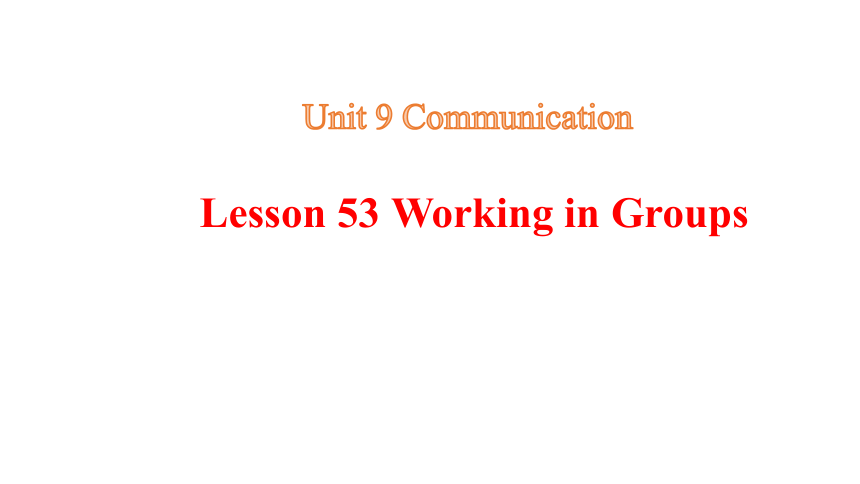 | |
| 格式 | pptx | ||
| 文件大小 | 8.4MB | ||
| 资源类型 | 教案 | ||
| 版本资源 | 冀教版 | ||
| 科目 | 英语 | ||
| 更新时间 | 2021-12-29 12:36:46 | ||
图片预览

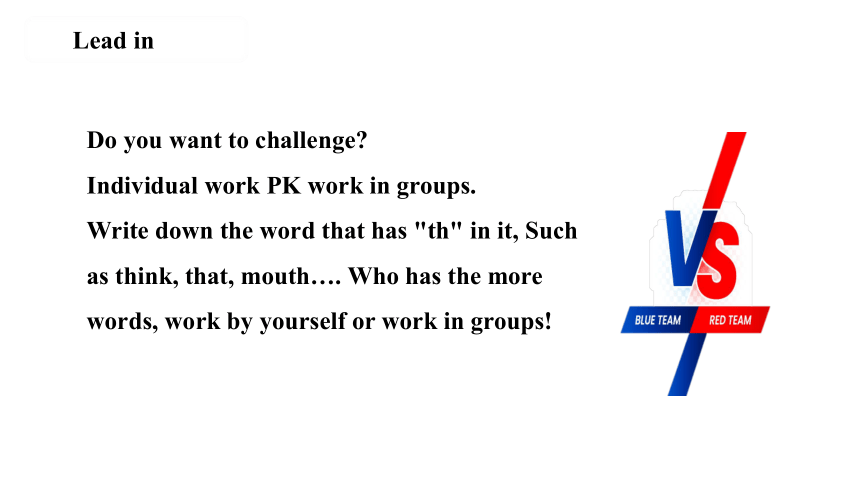

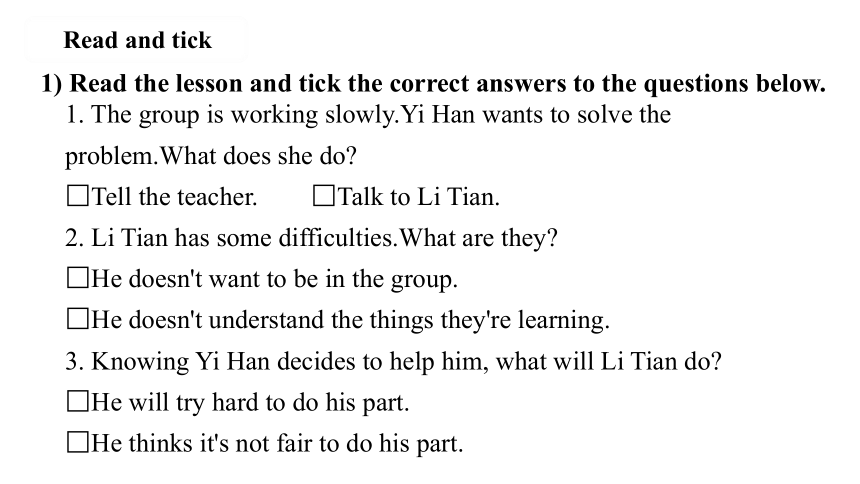
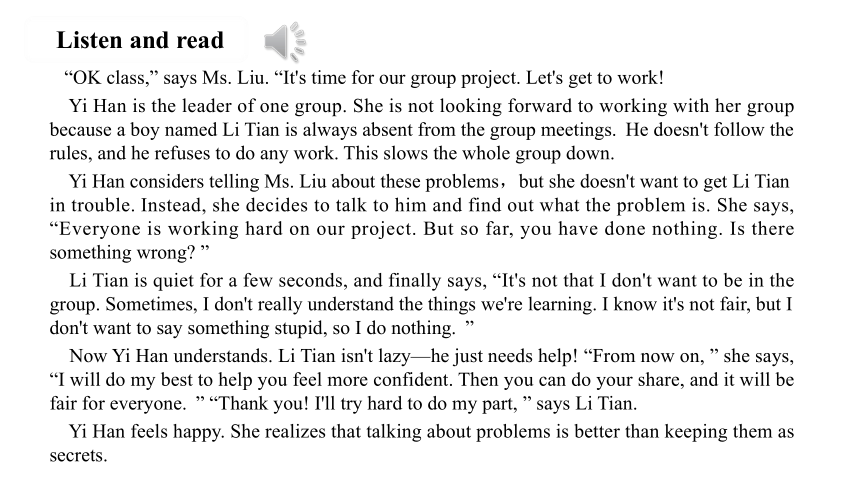
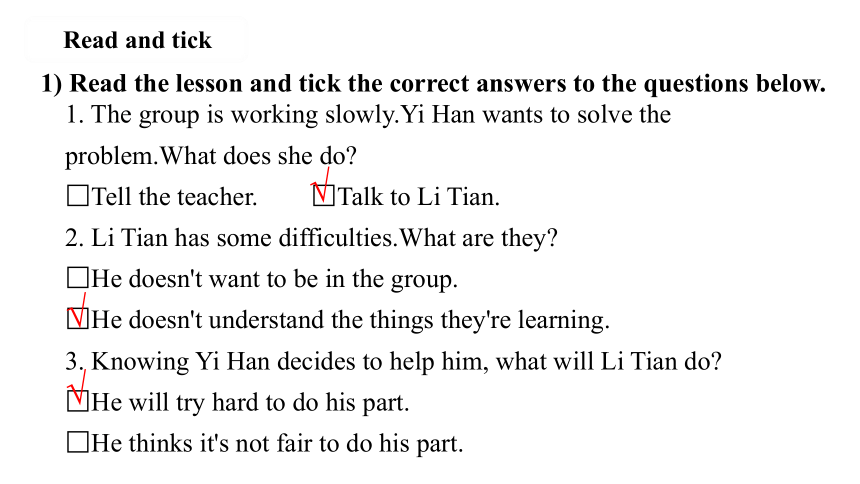

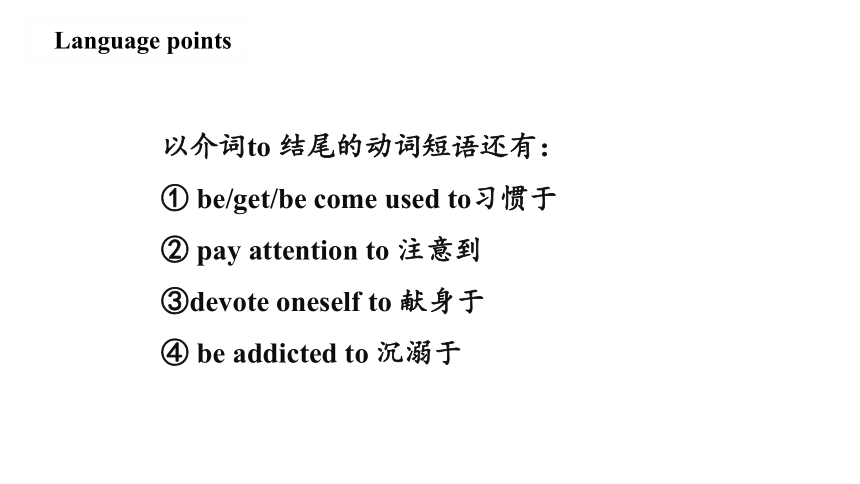
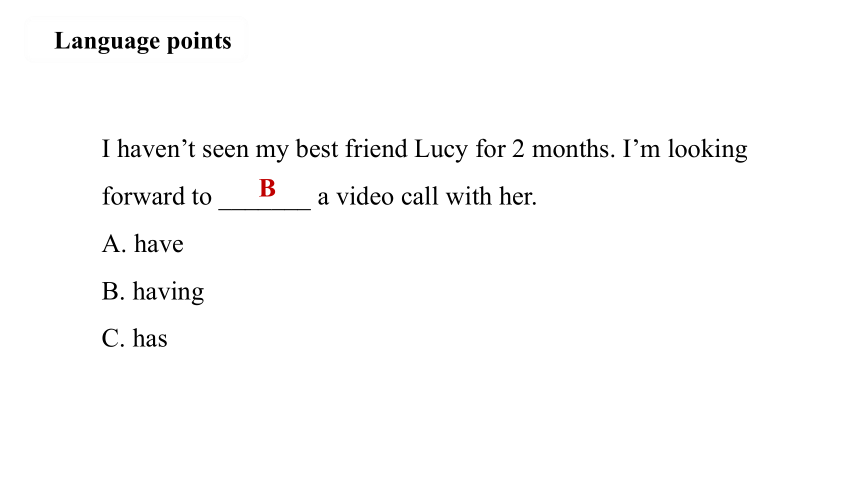
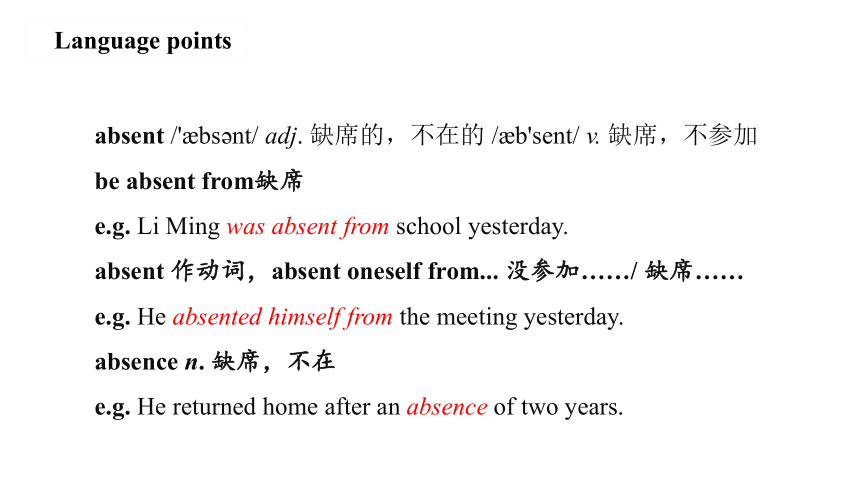
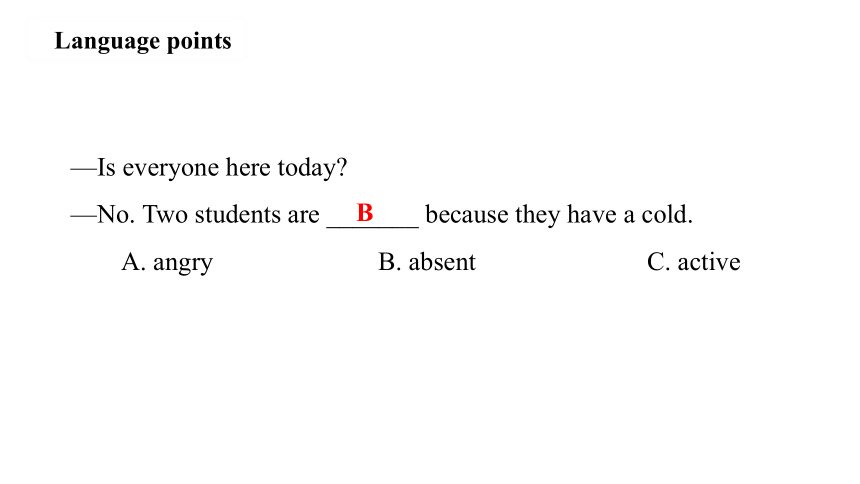
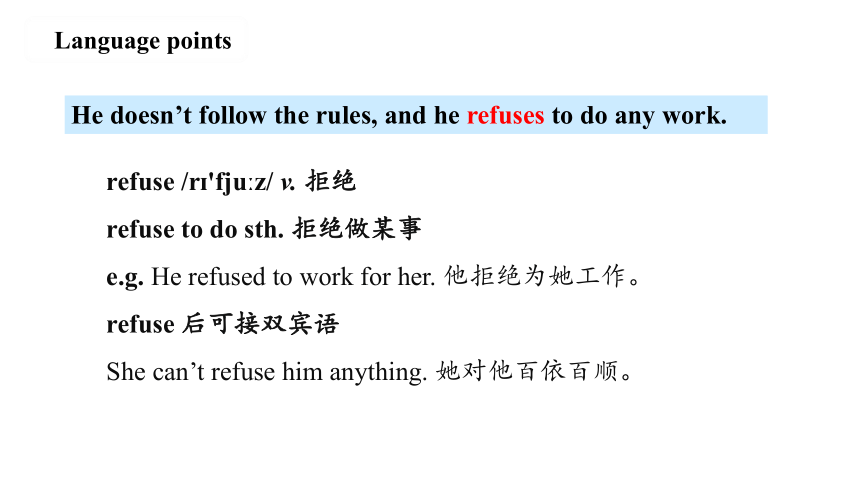
文档简介
(共37张PPT)
Lesson 53 Working in Groups
Unit 9 Communication
Lead in
Do you want to challenge
Individual work PK work in groups.
Write down the word that has "th" in it, Such as think, that, mouth…. Who has the more words, work by yourself or work in groups!
Think About It!
· Do you like group work
· What can you do to help your group work well together
· Which do you prefer Individual work or work in groups
1) Read the lesson and tick the correct answers to the questions below.
1. The group is working slowly.Yi Han wants to solve the
problem.What does she do
□Tell the teacher. □Talk to Li Tian.
2. Li Tian has some difficulties.What are they
□He doesn't want to be in the group.
□He doesn't understand the things they're learning.
3. Knowing Yi Han decides to help him, what will Li Tian do
□He will try hard to do his part.
□He thinks it's not fair to do his part.
Read and tick
“OK class,” says Ms. Liu. “It's time for our group project. Let's get to work!
Yi Han is the leader of one group. She is not looking forward to working with her group because a boy named Li Tian is always absent from the group meetings. He doesn't follow the rules, and he refuses to do any work. This slows the whole group down.
Yi Han considers telling Ms. Liu about these problems,but she doesn't want to get Li Tian in trouble. Instead, she decides to talk to him and find out what the problem is. She says, “Everyone is working hard on our project. But so far, you have done nothing. Is there something wrong ”
Li Tian is quiet for a few seconds, and finally says, “It's not that I don't want to be in the group. Sometimes, I don't really understand the things we're learning. I know it's not fair, but I don't want to say something stupid, so I do nothing. ”
Now Yi Han understands. Li Tian isn't lazy—he just needs help! “From now on, ” she says, “I will do my best to help you feel more confident. Then you can do your share, and it will be fair for everyone. ” “Thank you! I'll try hard to do my part, ” says Li Tian.
Yi Han feels happy. She realizes that talking about problems is better than keeping them as secrets.
Listen and read
1) Read the lesson and tick the correct answers to the questions below.
1. The group is working slowly.Yi Han wants to solve the
problem.What does she do
□Tell the teacher. □Talk to Li Tian.
2. Li Tian has some difficulties.What are they
□He doesn't want to be in the group.
□He doesn't understand the things they're learning.
3. Knowing Yi Han decides to help him, what will Li Tian do
□He will try hard to do his part.
□He thinks it's not fair to do his part.
√
√
√
Read and tick
She is not looking forward to working with her group because a
boy named Li Tian is always absent from the group meetings.
look forward to 期望
短语中的to为介词,后面常接名词、代词或动名词,不能接动词原形。
e.g. The students are looking forward to an English party.
学生们正在盼望着一个英语聚会。
I’m looking forward to going abroad. 我盼望着出国。
Language points
以介词to 结尾的动词短语还有:
① be/get/be come used to习惯于
② pay attention to 注意到
③devote oneself to 献身于
④ be addicted to 沉溺于
Language points
I haven’t seen my best friend Lucy for 2 months. I’m looking
forward to _______ a video call with her.
A. have
B. having
C. has
B
Language points
absent /' bs nt/ adj. 缺席的,不在的 / b'sent/ v. 缺席,不参加
be absent from缺席
e.g. Li Ming was absent from school yesterday.
absent 作动词,absent oneself from... 没参加……/ 缺席……
e.g. He absented himself from the meeting yesterday.
absence n. 缺席,不在
e.g. He returned home after an absence of two years.
Language points
—Is everyone here today
—No. Two students are _______ because they have a cold.
A. angry B. absent C. active
B
Language points
He doesn’t follow the rules, and he refuses to do any work.
refuse /r 'fju z/ v. 拒绝
refuse to do sth. 拒绝做某事
e.g. He refused to work for her. 他拒绝为她工作。
refuse 后可接双宾语
She can’t refuse him anything. 她对他百依百顺。
Language points
Mike invited me to his birthday party , but I r________
politely at once because I was preparing for an exam.
efused
Language points
This slows the whole group down.
slow down (使) 慢下来,(使) 减速
e.g. The growth of population has slowed down.
人口的增长已经慢了下来。
Slow your car down as you approach the school gate.
驶近学校大门时, 要放慢车速。
Language points
He was alive! So I _________ (slow) down, turned around and
stopped the car to save the man.
slowed
Language points
… but she doesn’t want to get Li Tian in trouble.
trouble /'tr bl/ n. 麻烦,困难,忧虑 v. 使烦恼
have trouble (in)doing sth.做某事有困难
e.g. I have a little trouble learning English grammar.
give sb. trouble 给某人造成麻烦
Don’t give me trouble when I am reading.
Language points
have trouble with...有……的病痛,因……而苦恼
e.g. I often have trouble with my teeth.
我常常牙痛。
be in trouble 处于困境之中
e.g. They are in trouble now.
他们现在处于困境中。
Language points
A group of elephants in Yunnan Province have trouble
________ a proper living place. We should help them.
A. find B. found C. to find D. finding
D
Language points
But so far, you have done nothing.
so far 到目前为止
so far = up to now/ until now,常用于句首或句末,句子常用现在完成时。
e.g. So far I haven’t got any help from him.
迄今为止,我还没有得到过他的任何帮助。
Language points
I like novels written by J.K. Rowling. So far I ________
all her works about Harry Potter.
A. have read B. read C. am reading
A
Language points
I know it’s not fair, but I don’t want to say something stupid,
so I do nothing.
fair /fe (r)/ adj. 公平的
fair 的一词多义:
公平的;公正的→ unfair(反义词)
合理的;适当的→ unfair(反义词)
浅色的;晴朗的→ dark(反义词)
Language points
拓展:fair 还可以用作名词,意为“露天游乐场;集市;展销会”。
e.g. I bought a wooden bowl at the local craft fair.
我在当地的工艺品展销会上买了个木制碗。
Language points
“From now on,” she says,“ I will do my best to help you feel
more confident.
from now on 从现在开始
e.g. From now on I’ll be more careful.
从今以后,我会更加小心。
Language points
The boy failed the English mid-term examination. Since then, he
worked harder. ______
A. At the moment B. In the future
C. In the past D. From then on
D
Language points
confident adj. 自信的
be confident about 对……自信
e.g. Be confident about yourself.
confidence n.自信
e.g. He was always amazed by her confidence.
confidently adv.自信地
e.g. He walked confidently across the hall.
Language points
confident 的词形变化:
① confidence n. 信心;自信
→ have confidence in 对……有信心
② confidently adv. 自信地
Language points
Then you can do your share, and it will be fair for everyone.
do one’s share 尽某人的责任;做分内工作
e.g. Everyone should do his share in protecting the animals.
每个人都应在保护动物方面尽自己的责任。
Language points
拓展:(1) share 作名词还可以表示“股份”。
e.g. People are keen to buy shares in new businesses.
人们热衷于购买新企业的股票。
(2) share 作动词,意为“分配;分享;分担”,常和介词with 一起搭配使用。
e.g. I always share the housework with my sister.
我总是和我的妹妹分担家务。
The two little girls often share their secrets.
这两个小女孩经常分享她们的秘密。
Language points
She realizes that talking about problems is better than
keeping them as secrets.
secret /'si kr t/ n. 秘密 adj. 秘密的
keep sth. a secret 将某事保密
keep a secret 保守秘密
e.g. He kept it a secret. 他将此事保密。
Language points
make a secret of 隐瞒
They made a secret of going to the island.
in secret=secretly 秘密地
They walked into the factory in secret.
拓展:secret 还可作形容词,其副词形式为secretly“秘密地”。
Language points
—What is the _______ of your beautiful English handwriting
—Practice makes perfect.
A. secret B. influence C. choice D. purpose
A
Language points
2) Fill in the blanks with the correct forms of the words or phrases in the box.
1. Don't miss “Gardening with Mary”on Saturday afternoons. Mary Green will share her rose growing ________ with you.
2. Cathy _________________ school because she had a bad headache.
so far trouble be absent from secret look forward to
secrets
was absent from
Let’s Do It!
3. I wrote a letter to Rose. I'm ____________________ her reply.
4. —How is your second hand laptop
—__________, so good.
5. He always gets himself into __________ by doing things carelessly.
so far trouble be absent from secret look forward to
looking forward to
So far
trouble
Let’s Do It!
3) Have you ever had any problems while working in a group How did you solve them Does communication play an important role Discuss it in your group.
Learn to learn
A group works well if every member works hard. To make a group work well, it's best to give each member a role. Take a group of four as an example. In the group, there should be an organizer, a recorder, a speaker and a rule keeper. Then each member can do his/her share.
Let’s Do It!
Show your group to us and let us know you well!
1. What's the name of your group
2. Who is the leader of your group
3. Who is good at making a speech
4. Who is quick-minded
5. What are the problems of your group
6. What are your group dreams
本节课我们主要学习了以下重点内容:
(1) 重点单词:absent, refuse, trouble, secret
(2) 重点短语:look forward to, so far
Summary
Lesson 53 Working in Groups
Unit 9 Communication
Lead in
Do you want to challenge
Individual work PK work in groups.
Write down the word that has "th" in it, Such as think, that, mouth…. Who has the more words, work by yourself or work in groups!
Think About It!
· Do you like group work
· What can you do to help your group work well together
· Which do you prefer Individual work or work in groups
1) Read the lesson and tick the correct answers to the questions below.
1. The group is working slowly.Yi Han wants to solve the
problem.What does she do
□Tell the teacher. □Talk to Li Tian.
2. Li Tian has some difficulties.What are they
□He doesn't want to be in the group.
□He doesn't understand the things they're learning.
3. Knowing Yi Han decides to help him, what will Li Tian do
□He will try hard to do his part.
□He thinks it's not fair to do his part.
Read and tick
“OK class,” says Ms. Liu. “It's time for our group project. Let's get to work!
Yi Han is the leader of one group. She is not looking forward to working with her group because a boy named Li Tian is always absent from the group meetings. He doesn't follow the rules, and he refuses to do any work. This slows the whole group down.
Yi Han considers telling Ms. Liu about these problems,but she doesn't want to get Li Tian in trouble. Instead, she decides to talk to him and find out what the problem is. She says, “Everyone is working hard on our project. But so far, you have done nothing. Is there something wrong ”
Li Tian is quiet for a few seconds, and finally says, “It's not that I don't want to be in the group. Sometimes, I don't really understand the things we're learning. I know it's not fair, but I don't want to say something stupid, so I do nothing. ”
Now Yi Han understands. Li Tian isn't lazy—he just needs help! “From now on, ” she says, “I will do my best to help you feel more confident. Then you can do your share, and it will be fair for everyone. ” “Thank you! I'll try hard to do my part, ” says Li Tian.
Yi Han feels happy. She realizes that talking about problems is better than keeping them as secrets.
Listen and read
1) Read the lesson and tick the correct answers to the questions below.
1. The group is working slowly.Yi Han wants to solve the
problem.What does she do
□Tell the teacher. □Talk to Li Tian.
2. Li Tian has some difficulties.What are they
□He doesn't want to be in the group.
□He doesn't understand the things they're learning.
3. Knowing Yi Han decides to help him, what will Li Tian do
□He will try hard to do his part.
□He thinks it's not fair to do his part.
√
√
√
Read and tick
She is not looking forward to working with her group because a
boy named Li Tian is always absent from the group meetings.
look forward to 期望
短语中的to为介词,后面常接名词、代词或动名词,不能接动词原形。
e.g. The students are looking forward to an English party.
学生们正在盼望着一个英语聚会。
I’m looking forward to going abroad. 我盼望着出国。
Language points
以介词to 结尾的动词短语还有:
① be/get/be come used to习惯于
② pay attention to 注意到
③devote oneself to 献身于
④ be addicted to 沉溺于
Language points
I haven’t seen my best friend Lucy for 2 months. I’m looking
forward to _______ a video call with her.
A. have
B. having
C. has
B
Language points
absent /' bs nt/ adj. 缺席的,不在的 / b'sent/ v. 缺席,不参加
be absent from缺席
e.g. Li Ming was absent from school yesterday.
absent 作动词,absent oneself from... 没参加……/ 缺席……
e.g. He absented himself from the meeting yesterday.
absence n. 缺席,不在
e.g. He returned home after an absence of two years.
Language points
—Is everyone here today
—No. Two students are _______ because they have a cold.
A. angry B. absent C. active
B
Language points
He doesn’t follow the rules, and he refuses to do any work.
refuse /r 'fju z/ v. 拒绝
refuse to do sth. 拒绝做某事
e.g. He refused to work for her. 他拒绝为她工作。
refuse 后可接双宾语
She can’t refuse him anything. 她对他百依百顺。
Language points
Mike invited me to his birthday party , but I r________
politely at once because I was preparing for an exam.
efused
Language points
This slows the whole group down.
slow down (使) 慢下来,(使) 减速
e.g. The growth of population has slowed down.
人口的增长已经慢了下来。
Slow your car down as you approach the school gate.
驶近学校大门时, 要放慢车速。
Language points
He was alive! So I _________ (slow) down, turned around and
stopped the car to save the man.
slowed
Language points
… but she doesn’t want to get Li Tian in trouble.
trouble /'tr bl/ n. 麻烦,困难,忧虑 v. 使烦恼
have trouble (in)doing sth.做某事有困难
e.g. I have a little trouble learning English grammar.
give sb. trouble 给某人造成麻烦
Don’t give me trouble when I am reading.
Language points
have trouble with...有……的病痛,因……而苦恼
e.g. I often have trouble with my teeth.
我常常牙痛。
be in trouble 处于困境之中
e.g. They are in trouble now.
他们现在处于困境中。
Language points
A group of elephants in Yunnan Province have trouble
________ a proper living place. We should help them.
A. find B. found C. to find D. finding
D
Language points
But so far, you have done nothing.
so far 到目前为止
so far = up to now/ until now,常用于句首或句末,句子常用现在完成时。
e.g. So far I haven’t got any help from him.
迄今为止,我还没有得到过他的任何帮助。
Language points
I like novels written by J.K. Rowling. So far I ________
all her works about Harry Potter.
A. have read B. read C. am reading
A
Language points
I know it’s not fair, but I don’t want to say something stupid,
so I do nothing.
fair /fe (r)/ adj. 公平的
fair 的一词多义:
公平的;公正的→ unfair(反义词)
合理的;适当的→ unfair(反义词)
浅色的;晴朗的→ dark(反义词)
Language points
拓展:fair 还可以用作名词,意为“露天游乐场;集市;展销会”。
e.g. I bought a wooden bowl at the local craft fair.
我在当地的工艺品展销会上买了个木制碗。
Language points
“From now on,” she says,“ I will do my best to help you feel
more confident.
from now on 从现在开始
e.g. From now on I’ll be more careful.
从今以后,我会更加小心。
Language points
The boy failed the English mid-term examination. Since then, he
worked harder. ______
A. At the moment B. In the future
C. In the past D. From then on
D
Language points
confident adj. 自信的
be confident about 对……自信
e.g. Be confident about yourself.
confidence n.自信
e.g. He was always amazed by her confidence.
confidently adv.自信地
e.g. He walked confidently across the hall.
Language points
confident 的词形变化:
① confidence n. 信心;自信
→ have confidence in 对……有信心
② confidently adv. 自信地
Language points
Then you can do your share, and it will be fair for everyone.
do one’s share 尽某人的责任;做分内工作
e.g. Everyone should do his share in protecting the animals.
每个人都应在保护动物方面尽自己的责任。
Language points
拓展:(1) share 作名词还可以表示“股份”。
e.g. People are keen to buy shares in new businesses.
人们热衷于购买新企业的股票。
(2) share 作动词,意为“分配;分享;分担”,常和介词with 一起搭配使用。
e.g. I always share the housework with my sister.
我总是和我的妹妹分担家务。
The two little girls often share their secrets.
这两个小女孩经常分享她们的秘密。
Language points
She realizes that talking about problems is better than
keeping them as secrets.
secret /'si kr t/ n. 秘密 adj. 秘密的
keep sth. a secret 将某事保密
keep a secret 保守秘密
e.g. He kept it a secret. 他将此事保密。
Language points
make a secret of 隐瞒
They made a secret of going to the island.
in secret=secretly 秘密地
They walked into the factory in secret.
拓展:secret 还可作形容词,其副词形式为secretly“秘密地”。
Language points
—What is the _______ of your beautiful English handwriting
—Practice makes perfect.
A. secret B. influence C. choice D. purpose
A
Language points
2) Fill in the blanks with the correct forms of the words or phrases in the box.
1. Don't miss “Gardening with Mary”on Saturday afternoons. Mary Green will share her rose growing ________ with you.
2. Cathy _________________ school because she had a bad headache.
so far trouble be absent from secret look forward to
secrets
was absent from
Let’s Do It!
3. I wrote a letter to Rose. I'm ____________________ her reply.
4. —How is your second hand laptop
—__________, so good.
5. He always gets himself into __________ by doing things carelessly.
so far trouble be absent from secret look forward to
looking forward to
So far
trouble
Let’s Do It!
3) Have you ever had any problems while working in a group How did you solve them Does communication play an important role Discuss it in your group.
Learn to learn
A group works well if every member works hard. To make a group work well, it's best to give each member a role. Take a group of four as an example. In the group, there should be an organizer, a recorder, a speaker and a rule keeper. Then each member can do his/her share.
Let’s Do It!
Show your group to us and let us know you well!
1. What's the name of your group
2. Who is the leader of your group
3. Who is good at making a speech
4. Who is quick-minded
5. What are the problems of your group
6. What are your group dreams
本节课我们主要学习了以下重点内容:
(1) 重点单词:absent, refuse, trouble, secret
(2) 重点短语:look forward to, so far
Summary
同课章节目录
- Unit 7 Work for Peace
- Lesson 37 Don't Fight!
- Lesson 38 Making School a Better Place
- Lesson 39 The Dove and the Olive Branch
- Lesson 40 The UN—Power of Words
- Lesson 41 Jenny's Good Advice
- Lesson 42 Peace at Last
- Unit Review
- Unit 8 Culture Shapes Us
- Lesson 43 A Visit to Chinatown
- Lesson 44 Popular Sayings
- Lesson 45 Different Manners
- Lesson 46 Home to Many Cultures
- Lesson 47 Good Manners
- Lesson 48 Supper with the Bradshaws
- Unit Review
- Unit 9 Communication
- Lesson 49 Get Along with Others
- Lesson 50 Tips for Good Communication
- Lesson 51 What Could Be Wrong?
- Lesson 52 The Power of a Smile
- Lesson 53 Working in Groups
- Lesson 54 How Embarrassing!
- Unit Review
- Unit 10 Get Ready for the Future
- Lesson 55 Look into the Future
- Lesson 56 Manage Your Time
- Lesson 57 Best Wishes
- Lesson 58 Ms.Liu's Speech
- Lesson 59 Keep Your Choices Open
- Lesson 60 Get a Good Education
- Unit Review
